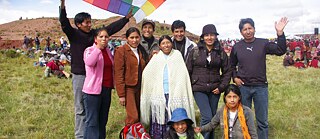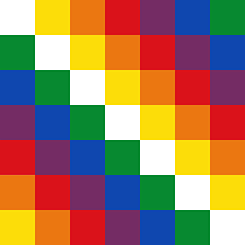Linguistic Identity Aymara in the Internet Age

The Jaqi Aru Team in Tiwanaku in western Bolivia | Photo: Jaqi Aru
In the Qullasuyu region (the former name for today’s national territory of Bolivia), 36 indigenous groups and languages are registered, among them the Aymara and their eponymous language. Together with various groups, the linguist and Internet activist Ruben Hilari Quispe is campaigning for the Aymara language and culture on the Internet. Here, he tells his story.
According to UNESCO, around half of all languages are at risk of extinction by the end of this century, the so-called digital century. Many scholars affirm that with every language lost, the knowledge of a culture or society is also lost. The Internet seems to be accelerating the extinction of these languages in some contexts, while in others it seems to be revitalising and strengthening them.We are at the beginning of the third decade of this century and we see that Aymara has remained vibrant on the Internet. Already, ads on social media are being tagged #AymaraxTaqikunatakiskiwa (Aymara is for everyone), demonstrating the power and vibrancy that the Aymara language and culture have gained in digital media and on Internet platforms: The Aymara use their written and oral language daily to communicate about a wide variety of everyday topics on social networks such as Facebook or WhatsApp.
We are observing how Aymara speakers with social, cultural, historical and linguistic awareness become supporters and cybernauts to revive and strengthen their language on the Internet. Through Aymara, ways of thinking or living that can’t be put into words in other languages find their way onto the Internet. Linguistic peculiarities of Aymara such as jiwaspacha or jiwasa (inclusive “us”), jathachaña (“the seed of the word”) or taqi chuyma (“with a whole heart”) are examples.
#InAymara #ForAymara #FromAymara
 The Wiphala – the flag of the indigenous people of the Andean highlands
| Public Domain
Not a day goes by without people communicating in Aymara on social networks. From the beginning, our idea was to reach the total of over three million Aymara and their descendants in the region and the world through the Internet. The Aymara have survived in an authoritarian, colonial, racist and exclusive society; a society that has met their language with prejudice and stigmatised it. Who are the Aymara? Many of us are members of different ayllunaka (Aymara and Quechua communities made up of one large family) or come from rural areas and have moved to the city to study or work.
The Wiphala – the flag of the indigenous people of the Andean highlands
| Public Domain
Not a day goes by without people communicating in Aymara on social networks. From the beginning, our idea was to reach the total of over three million Aymara and their descendants in the region and the world through the Internet. The Aymara have survived in an authoritarian, colonial, racist and exclusive society; a society that has met their language with prejudice and stigmatised it. Who are the Aymara? Many of us are members of different ayllunaka (Aymara and Quechua communities made up of one large family) or come from rural areas and have moved to the city to study or work.
Linguistic and technological empowerment
Several groups are working to preserve the Aymara language. Jaqi Aru (“language of the people”), for example, is an organisation of young bilingual Aymara in El Alto with now legally regulated status in Bolivia. Its aim is linguistic, socio-cultural, technological and productive empowerment through research and projects that contribute to the development of a balanced, just and harmonious society in rural and urban areas.Jaqi Aru put Aymara on the Internet by first always communicating with one another in Aymara. Initially, we did translations for the international Global Voices network. Available in 53 languages from around the world, Global Voices now includes Aymara. We launched the blog Aruskipasipxañäni, where we write on various topics and with which we inspire many other young Internet communities. To promote technological autonomy, we founded the Cuyahuani 2.0 project, an intranet with antennas we made ourselves at the Universidad Aymara Tupak Katari.
Wikipedia Aymarata
We have also been working offline, writing Aymara philosophy in poetry form. Among other things, we organise Nayrïr Aymarat Qillqañ Ch’ikhi Amuyunak Yatiqäwi (the first creative writing course in Aymara) to promote Aymara writers.
24 hours #InAymara
On the SEOTV television channel, Jaqi Aru’s team has found a new way to revive and strengthen the Aymara language and culture. The team members act as television presenters. Our programme “Aruskipt’asipxañanakasakipunirakispawa – We All Need Constant Conversation” is #InAymara.Having gained all this experience, we would like to look more deeply into the epistemology of Aymara language and culture in the context of the TICs (projects on topics related to Aymara and technology). Our desire is to continue learning and engaging so that at some point the Aymara language and culture can constantly adapt to new realities. To continue doing projects on software development, robotics, artificial intelligence, machine translation is our passion, our purpose in life.
Interested in Aymara
In summary, we can say that we have taken root with three Internet giants (Facebook, Google and YouTube). Google Translator has already included Aymara among its 133 languages. Metaverse has announced that it will include Aymara in its multi-translator with 200 languages. Elias Ajata Rivera, administrator of a Facebook page for learning Aymara with over 219,000 members, has created subtitles and tried them out on YouTube.So, the possibilities for revitalising and strengthening the Aymara language and culture on the Internet are many. Throughout the process, the linguistic and philosophical focus of the jiwasa (category of us), taqi chuyma (with a whole heart) and aru jathachaña (the seed of the word) is indispensable in the Aymara world.